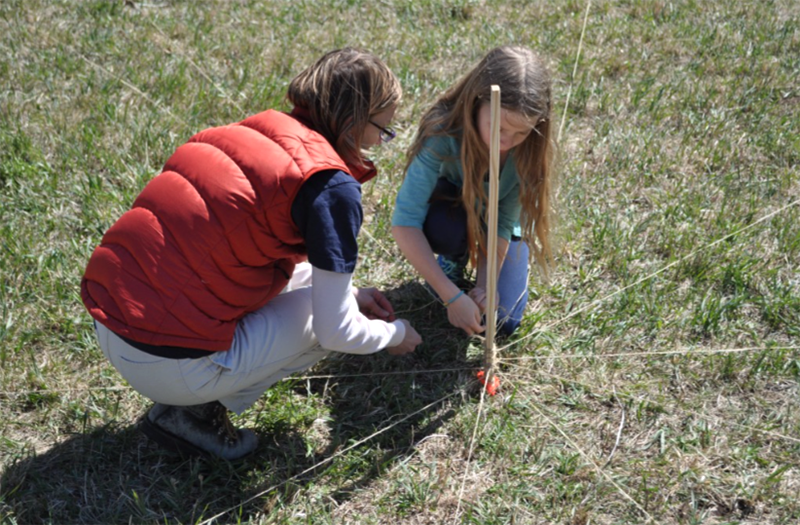
A Birches School student and helper stake out a plant plot for a pollinator meadow to prepare the site for planting.
A new Lincoln collaborative called People for Pollinators is sponsoring three events to advance its mission to promote, protect and create native habitat that supports the vitality of pollinators in the face of bee colony collapse.
People for Pollinators had its roots at an April 2015 symposium on pollinators in crisis with bee researcher Noah Wilson-Rich. The event sparked an idea to create plots of pollinator-friendly plants on Lincoln conservation land. Parents from the Birches School who were at the event approached the head of the school, which reached out to the Lincoln Land Conservation Trust (LLCT). Together with Lincoln Agricultural Commission (AgComm) and the Lincoln Garden Club, both of which sponsored the Wilson-Rich talk, the partnership was created.
The People for Pollinators collaboration later grew to include the Conservation Commission, Stonegate Gardens and individuals in the Lincoln community as well. The effort is supported by grants from Birches School, the LLCT and a private donor.
The initiative first put boots on the ground (albeit small boots) earlier this month when students from Birches School together with some People for Pollinators members started preliminary work on a native, perennial, chemical-free pollinating meadow. The crew staked out plant plots on conservation land adjacent to the Smith School building and set up the solarization process to prepare the site for planting.
On Sunday, April 24 from 1-4 p.m., the Birches School will host “You’re a Citizen Scientist: People for Pollinators Project,” part of the Cambridge Science Festival. Visitors can learn from students in grades K-5 how to start their own grassroots effort to save the pollinators, set up experimental paradigms in their own gardens and have a positive impact on the ecosystem. The event is free, but please RSVP to events@birchesschool.org.
At the town-wide “40 Years of Community” fair on Saturday, April 30 from 1-4 p.m. in Pierce Park, People for Pollinators will present information and facilitate several activities, including making a native-plant “seed bomb” for participants to take home with them to start a pollinator habitat of their own
Finally, at an a community-wide event on June 4 from 10 a.m. to 1 p.m., People for Pollinators and volunteers will plant plugs and seed the meadow site. Participants are encouraged to bring gardening gloves, a trowel and sturdy shoes. Hand tools will be provided for those who do not bring any. Long sleeves and pants recommended for ticks. Members of the collaborative and students from Birches School will help and direct participants. This is a drop-in event; the rain date is June 5.
In March, the state Department of Agricultural Resources released a draft of the Massachusetts Pollinator Protection Plan that was vehemently opposed by state beekeepers, who themselves released a plan last August called the Massachusetts Pollinator Protection Plan Framework. Beekeepers assert that pesticides, especially neonicintinoids—a class of insecticides used in agriculture and found in garden products—are the major source of the colony collapse problem.
Leave a Reply